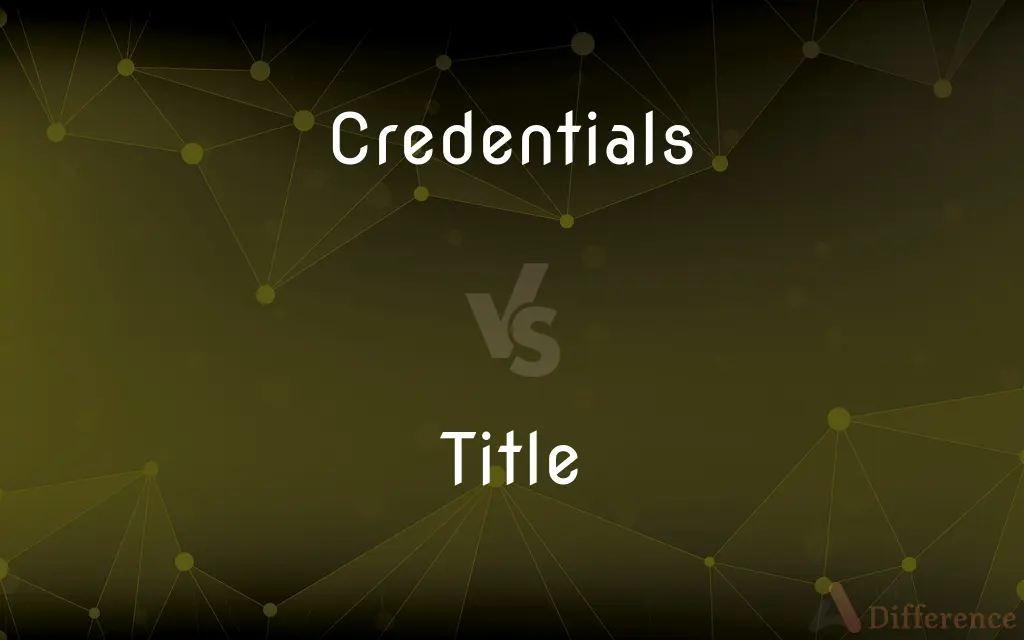Credentials vs. Title — What's the Difference?
By Tayyaba Rehman & Fiza Rafique — Updated on April 27, 2024
"Credentials" refer to qualifications, certifications, or achievements that verify one's capability in a professional field, whereas a "title" is a formal designation or name that reflects one's professional position or academic achievement.

Difference Between Credentials and Title
Table of Contents
ADVERTISEMENT
Key Differences
Credentials include degrees, diplomas, licenses, and certificates that serve as proof of someone’s qualifications or expertise in a specific area. Whereas, a title such as Doctor, Professor, or CEO, explicitly states a person's role or rank within a professional or academic setting.
Credentials are often required to enter or advance in certain professions and are obtained through education, examination, or experience. On the other hand, a title can be honorary or functional and is used to signify a person’s authority, role, or status within an organization or society.
Credentials are typically documented and can be verified by educational institutions or professional organizations. While, a title is usually conferred by an employer, educational institution, or professional body and can be included in official communications and business cards.
Earning credentials often involves a significant investment of time and effort in education and training. Whereas, a title might be awarded as recognition of one’s position or achieved as a result of being promoted within an organization.
Credentials can be a prerequisite for obtaining a title. For instance, one must have certain academic degrees or professional certifications before being eligible for certain titles like "Certified Public Accountant" or "Registered Nurse". While, having a title does not necessarily guarantee that the person has specific credentials unless those credentials are required for holding that title.
ADVERTISEMENT
Comparison Chart
Definition
Qualifications or certifications proving professional competence.
Formal designation reflecting position or academic achievement.
Purpose
To verify expertise and ability in a specific field.
To denote role, status, or authority.
Obtained Through
Education, certification, and professional experience.
Appointment, promotion, or academic conferment.
Documentation
Often involves certificates, licenses, or official records.
May be indicated through business cards, letterheads, etc.
Relation to Career
Essential for entry and advancement in many professions.
Reflects current position or honorific status.
Compare with Definitions
Credentials
Evidence of qualifications.
Her credentials include a Master's degree in Biology and a teaching certificate.
Title
Can be linked to specific roles.
She was promoted to the title of Chief Technology Officer last year.
Credentials
Reflects specialized knowledge.
Her credentials were verified before she was hired.
Title
Reflects authority or honor.
His title as Captain commands respect in the military.
Credentials
Can be licensed or certified.
He added his new CPA credential to his resume.
Title
May be inherited or conferred.
The title of Duke is passed down through her family.
Credentials
Often detailed in a professional CV.
She listed her academic and professional credentials prominently.
Title
A title is one or more words used before or after a person's name, in certain contexts. It may signify either generation, an official position, or a professional or academic qualification.
Credentials
Required for certain professions.
Medical credentials are mandatory for practicing doctors.
Title
The name of a book, composition, or other artistic work
The author and title of the book
Credentials
That which entitles one to confidence, credit, or authority.
Title
A name that describes someone's position or job
Leese assumed the title of director general
Credentials
Credentials Evidence or testimonials concerning one's right to credit, confidence, or authority
The new ambassador presented her credentials to the president.
Title
The position of being the champion of a major sports competition
Davis won the world title for the first time in 1981
Credentials
To supply with credentials
"trained, professional, credentialed child care" (Lee Salk).
Title
A right or claim to the ownership of property or to a rank or throne
The buyer acquires a good title to the goods
A grocery family had title to the property
Credentials
Plural of credential
Title
(in church use) a fixed sphere of work and source of income as a condition for ordination.
Credentials
Documentary evidence of someone's right to credit or authority, especially such a document given to an ambassador by a country.
Title
Give a name to (a book, composition, or other work)
A report titled The Lost Land
Credentials
Login data
Title
An identifying name given to a book, play, film, musical composition, or other work.
Credentials
A document attesting to the truth of certain stated facts
Title
A general or descriptive heading, as of a book chapter.
Title
A written work that is published or about to be published
The titles in the publisher's fall catalog.
Title
A division of a legal code, generally consisting of multiple related statutes.
Title
Often titles Written material to be read by viewers that is included in a film or television show, typically presenting credits, narration, or dialogue.
Title
A written piece of translated dialogue superimposed at the bottom of the frame during a film; a subtitle.
Title
A formal appellation attached to the name of a person as a sign of office, rank, profession, or hereditary privilege.
Title
A descriptive name; an epithet
The dubious title of the worst bowler in the league.
Title
A right or claim, or the basis of a right or claim
"The weight of a fish is commonly its only title to fame" (Henry David Thoreau).
Title
A form of ownership free of valid claims by other parties.
Title
The aggregate evidence that gives rise to a legal right of possession or control.
Title
The instrument, such as a deed, that constitutes this evidence.
Title
Sports & Games A championship
Which boxer won the heavyweight title?.
Title
A source of income or area of work required of a candidate for ordination in the Church of England.
Title
A Roman Catholic church in or near Rome having a cardinal for its nominal head.
Title
To give a name or title to.
Title
An appellation given to a person or family to signify either veneration, official position, social rank, the possession of assets or properties, or a professional or academic qualification. See also :Category:Titles
Title
(property law) Legal right to ownership of a property; a deed or other certificate proving this.
A good title to an estate, or an imperfect title
Title
In canon law, that by which a beneficiary holds a benefice.
Title
A church to which a priest was ordained, and where he was to reside.
Title
The name of a book, film, musical piece, painting, or other work of art.
I know the singer's name, but not the title of the song.
Title
A publication.
The retailer carries thousands of titles.
Buyers of the new video game console can choose from three bundled titles.
Title
A section or division of a subject, as of a law or a book.
Title
A written title, credit, or caption shown with a film, video, or performance.
The titles scrolled by too quickly to read.
Title
(bookbinding) The panel for the name, between the bands of the back of a book.
Title
The subject of a writing; a short phrase that summarizes the entire topic.
Title
A division of an act of law
Title II of the USA PATRIOT Act
Title
(sports) The recognition given to the winner of a championship in sports.
Title
A long title.
Title
A short title.
Title
(transitive) To assign a title to; to entitle.
Title
An inscription put over or upon anything as a name by which it is known.
Title
The inscription in the beginning of a book, usually containing the subject of the work, the author's and publisher's names, the date, etc.
Title
The panel for the name, between the bands of the back of a book.
Title
A section or division of a subject, as of a law, a book, specif. (Roman & Canon Laws), a chapter or division of a law book.
Title
An appellation of dignity, distinction, or preëminence (hereditary or acquired), given to persons, as duke marquis, honorable, esquire, etc.
With his former title greet Macbeth.
Title
A name; an appellation; a designation.
Title
That which constitutes a just cause of exclusive possession; that which is the foundation of ownership of property, real or personal; a right; as, a good title to an estate, or an imperfect title.
Title
A church to which a priest was ordained, and where he was to reside.
Title
To call by a title; to name; to entitle.
Hadrian, having quieted the island, took it for honor to be titled on his coin, "The Restorer of Britain."
Title
A heading that names a statute or legislative bill; may give a brief summary of the matters it deals with;
Title 8 provided federal help for schools
Title
The name of a work of art or literary composition etc.;
He looked for books with the word `jazz' in the title
He refused to give titles to his paintings
I can never remember movie titles
Title
A general or descriptive heading for a section of a written work;
The novel had chapter titles
Title
The status of being a champion;
He held the title for two years
Title
A legal document signed and sealed and delivered to effect a transfer of property and to show the legal right to possess it;
He signed the deed
He kept the title to his car in the glove compartment
Title
An identifying appellation signifying status or function: e.g. Mr. or General;
The professor didn't like his friends to use his formal title
Title
An established or recognized right;
A strong legal claim to the property
He had no documents confirming his title to his father's estate
He staked his claim
Title
(usually plural) written material introduced into a movie or TV show to give credits or represent dialogue or explain an action;
The titles go by faster than I can read
Title
An appellation signifying nobility;
`your majesty' is the appropriate title to use in addressing a king
Title
An informal right to something;
His claim on her attentions
His title to fame
Title
Give a title to
Title
Designate by an identifying term;
They styled their nation `The Confederate States'
Title
Denotes professional or academic status.
The title of Professor is granted after years of academic contribution.
Title
Used formally and informally.
Everyone refers to him by his title, Doctor Smith.
Common Curiosities
What are credentials?
Credentials are documented qualifications or certifications that validate an individual’s expertise in a specific field.
Can credentials affect one’s title?
Yes, certain credentials are necessary to qualify for specific titles, especially in professions requiring formal qualifications.
Are credentials permanent?
Some credentials, like degrees, are permanent, while others, such as licenses, may require periodic renewal or continuing education.
What does it mean to have a professional title?
Having a professional title means holding a designated position that often comes with specific responsibilities and authority within a workplace.
Do titles always reflect credentials?
Titles may or may not reflect an individual's credentials accurately. While some titles directly correlate with specific qualifications, others may be more honorary or symbolic.
Why is a title important?
A title can signify a person’s role, status, or authority within an organization or society.
How are titles used in the workplace?
Titles are used to define hierarchy, responsibility, and job functions within an organization.
How does one earn credentials?
Credentials are typically earned through educational achievements, professional certifications, or completing specific training programs.
Can someone hold multiple titles with the same credentials?
Yes, an individual may hold multiple titles within an organization or community while possessing the same set of credentials, depending on their roles and responsibilities.
Can titles change without altering credentials?
Yes, titles can change due to promotions, job changes, or organizational restructuring without affecting an individual's existing credentials or qualifications.
Share Your Discovery

Previous Comparison
Finding vs. Findings
Next Comparison
Amun vs. AmenAuthor Spotlight
Written by
Tayyaba RehmanTayyaba Rehman is a distinguished writer, currently serving as a primary contributor to askdifference.com. As a researcher in semantics and etymology, Tayyaba's passion for the complexity of languages and their distinctions has found a perfect home on the platform. Tayyaba delves into the intricacies of language, distinguishing between commonly confused words and phrases, thereby providing clarity for readers worldwide.
Co-written by
Fiza RafiqueFiza Rafique is a skilled content writer at AskDifference.com, where she meticulously refines and enhances written pieces. Drawing from her vast editorial expertise, Fiza ensures clarity, accuracy, and precision in every article. Passionate about language, she continually seeks to elevate the quality of content for readers worldwide.














































